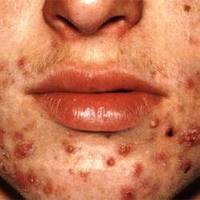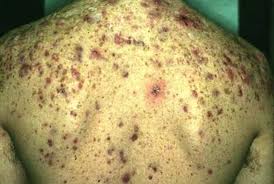Acne diet
Definition
The acne diet or more accurately, the acne-free diet, is simply a way of eating claims to improves or eliminates acne. There is some debate in the medical community about the impact of diet on acne; however, there is a body of evidence to support the idea that what is eaten may affect the skin. By reviewing research from over 40 years, doctors such as dermatologist, Dean Goodless have developed a set of recommendations regarding foods that may prevent acne. In his book The Acne-Free Diet Plan, Dr. Goodless presents his recommendations. He suggests eating a diet low in fat and high in fiber along with avoiding peanut product, fried foods, excessive salt, dairy products, foods that are high in refined sugars, and high carbohydrate foods.
Origins
As long as people have had pimples, there have been attempts to clear them up quickly or prevent them all together. Most cultures have folk remedies to help clear the skin. It wasn’t until the last 50 years that serious scientific research has been conducted to confirm or disprove these folk tales andmyths.Oneof the earliest studies about food and acne focused on chocolate. This study found that chocolate did not increase acne breakouts. Other studies since have confirmed this finding. For the most part, acne treatment has been the emphasis of research; however, there have been isolated studies that explored the effect of specific vitamin and mineral supplements on acne. Other studies have investigated ethnic groups and communities from the Pacific Islands to Africa where there is little or no incidence of acne, even during puberty. When the diets of these people are compared to the typical Western diet, there are nutritionally significant differences. The ethnic groups with very low incidence of acne ate predominately plant-based diets that were low in fat and virtually sugar-free. The typical Western diet is heavy in meats, saturated fat, refined sugar, and highly processed foods. By studying these differences, doctors and researchers have developed suggestions for dietary changes to improve or eliminate acne.



Description:
Integrating the results of many studies, dermatologists and nutritionists have developed a list of foods to avoid and beneficial vitamins and minerals to consume:
* Eat 20 to 30 grams of fiber every day-Fiber helps keep the colon clean and may remove toxins from the body before they reach the skin.
* Eat a low fat diet-The cultures whose natural diet was low in fat, had less acne, and high fat consumption may elevate hormone levels in the body that cause blemishes on the skin.
* Avoid peanut products-Peanut products were found to cause acne flare ups in a study of 500 adolescents.
* Avoid fried foods-Fried foods were found to caused break outs.
* Limit salt intake especially table salt or iodized salt- Many people with acne have elevated levels of iodine, found in table salt, in their blood stream during acne flare ups.
* Avoid highly salty sacks such as chips, lunch meats, canned foods, and salted popcorn-These foods are high in salt and, in some cases, fat.
* Avoid dairy products such as milk, cheese and ice cream.
* Avoid highly processed carbohydrates such as sodas, candy, and baked goods-High carbohydrate foods raise the level of insulin in the blood and elevated insulevel may raise the levels of acne-causing hormones in the body.
In addition to following the acne diet suggestions, taking the following supplements are proposed to also help prevent acne:
* Vitamin A (may be toxic consult your doctor first)
* Vitamin E
* Vitamin B6
* Selenium
* Zinc
* Omega-3 Fatty Acid
* Chromium
Integrating the results of many studies, dermatologists and nutritionists have developed a list of foods to avoid and beneficial vitamins and minerals to consume:
* Eat 20 to 30 grams of fiber every day-Fiber helps keep the colon clean and may remove toxins from the body before they reach the skin.
* Eat a low fat diet-The cultures whose natural diet was low in fat, had less acne, and high fat consumption may elevate hormone levels in the body that cause blemishes on the skin.
* Avoid peanut products-Peanut products were found to cause acne flare ups in a study of 500 adolescents.
* Avoid fried foods-Fried foods were found to caused break outs.
* Limit salt intake especially table salt or iodized salt- Many people with acne have elevated levels of iodine, found in table salt, in their blood stream during acne flare ups.
* Avoid highly salty sacks such as chips, lunch meats, canned foods, and salted popcorn-These foods are high in salt and, in some cases, fat.
* Avoid dairy products such as milk, cheese and ice cream.
* Avoid highly processed carbohydrates such as sodas, candy, and baked goods-High carbohydrate foods raise the level of insulin in the blood and elevated insulevel may raise the levels of acne-causing hormones in the body.
In addition to following the acne diet suggestions, taking the following supplements are proposed to also help prevent acne:
* Vitamin A (may be toxic consult your doctor first)
* Vitamin E
* Vitamin B6
* Selenium
* Zinc
* Omega-3 Fatty Acid
* Chromium

Function
Acne is caused when glands in the skin called sebaceous glands begin to form sticky oil called sebum. These glands are stimulated by hormones that become active at puberty which is why acne occurs most often in adolescence when these hormones are produced in abundance. The oils formed by the sebaceous glands hold dead skin cells preventing them form being sloughed off. As these cells die, they create the perfect environment for bacteria to grow. When these bacteria called Acne Vulgaris become too plentiful, they will attempt to erupt from the skin causing a pimple. Sometimes, when the bacteria grow, the body sends white blood cells to fight the infection. This natural reaction can cause painful, large cysts to form in the deeper layers of skin. Chocolate may not cause acne, but the fat and sugar that usually accompanies chocolate may. Eliminating certain foods from the diet and increasing the amount of specific vitamins and minerals may help reduce the amount of sebum produced and prevent acne breakouts. However, the interaction between diet and acne is not a simple cause and effect relationship. If an oily food is eaten, the oil does not travel to the skin or cause it to be oily, but high levels of fat in the blood may effect the production of hormones such as testosterone. Higher levels of hormones may cause acne to worsen. Many high carbohydrate foods are believed to worsen acne. Researchers have discovered that high carbohydrate foods increase the levels of insulin in the blood. High levels of insulin can raise hormone levels in the blood. Researchers recognize that not all carbohydrates are bad. Some carbohydrates digest more slowly than others, causing a gradual rise in blood sugar after eating. Researchers have developed a glycemic index to rank carbohydrates and other foods according to the effect they have on blood sugar.
The glycemic index is a scale of 0-100. Foods with higher glycemic index ratings break down quickly and cause a sharp spike in blood sugar. Foods that have a high glycemic index rating include: white bread, white rice, white potatoes depending on how they are cooked, beer, corn products and some products containing refined sugars. Foods with moderate glycemic index ratings include: whole grain breads and pastas, brown rice, sweet potatoes, green peas, many fruits (especially when eaten alone) and yogurt. Many of these foods are on the list of foods to avoid in the acne diet. Low glycemic index or no GI foods include: rye grain, nuts, legumes such as black beans and lentils, green vegetables, apricots, and cherries. These foods may be enjoyed an may not worsen acne. Foods that are high in fiber tend to have lower glycemic index numbers, because fiber takes longer to digest. Studies have shown that the presence of other foods such as fats like olive oil, can also slow digestion and keep blood sugar from rising too quickly. The glycemic index can be used along with the acne diet, to help choose which carbohydrates can be eaten with the least effect on blood sugar.
Acne is caused when glands in the skin called sebaceous glands begin to form sticky oil called sebum. These glands are stimulated by hormones that become active at puberty which is why acne occurs most often in adolescence when these hormones are produced in abundance. The oils formed by the sebaceous glands hold dead skin cells preventing them form being sloughed off. As these cells die, they create the perfect environment for bacteria to grow. When these bacteria called Acne Vulgaris become too plentiful, they will attempt to erupt from the skin causing a pimple. Sometimes, when the bacteria grow, the body sends white blood cells to fight the infection. This natural reaction can cause painful, large cysts to form in the deeper layers of skin. Chocolate may not cause acne, but the fat and sugar that usually accompanies chocolate may. Eliminating certain foods from the diet and increasing the amount of specific vitamins and minerals may help reduce the amount of sebum produced and prevent acne breakouts. However, the interaction between diet and acne is not a simple cause and effect relationship. If an oily food is eaten, the oil does not travel to the skin or cause it to be oily, but high levels of fat in the blood may effect the production of hormones such as testosterone. Higher levels of hormones may cause acne to worsen. Many high carbohydrate foods are believed to worsen acne. Researchers have discovered that high carbohydrate foods increase the levels of insulin in the blood. High levels of insulin can raise hormone levels in the blood. Researchers recognize that not all carbohydrates are bad. Some carbohydrates digest more slowly than others, causing a gradual rise in blood sugar after eating. Researchers have developed a glycemic index to rank carbohydrates and other foods according to the effect they have on blood sugar.
The glycemic index is a scale of 0-100. Foods with higher glycemic index ratings break down quickly and cause a sharp spike in blood sugar. Foods that have a high glycemic index rating include: white bread, white rice, white potatoes depending on how they are cooked, beer, corn products and some products containing refined sugars. Foods with moderate glycemic index ratings include: whole grain breads and pastas, brown rice, sweet potatoes, green peas, many fruits (especially when eaten alone) and yogurt. Many of these foods are on the list of foods to avoid in the acne diet. Low glycemic index or no GI foods include: rye grain, nuts, legumes such as black beans and lentils, green vegetables, apricots, and cherries. These foods may be enjoyed an may not worsen acne. Foods that are high in fiber tend to have lower glycemic index numbers, because fiber takes longer to digest. Studies have shown that the presence of other foods such as fats like olive oil, can also slow digestion and keep blood sugar from rising too quickly. The glycemic index can be used along with the acne diet, to help choose which carbohydrates can be eaten with the least effect on blood sugar.
Contacts: lubopitno_bg@abv.bg www.encyclopedia.lubopitko-bg.com Corporation. All rights reserved.
DON'T FORGET - KNOWLEDGE IS EVERYTHING!